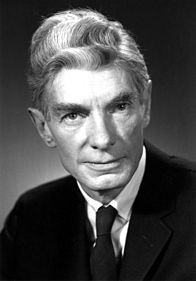- Malcolm Moos
-
Malcolm Moos 
President of the University of Minnesota Term 1967 – 1974 Predecessor O. Meredith Wilson Successor C. Peter Magrath Born April 19, 1916
Saint Paul, MinnesotaDied January 28, 1982 (aged 65)
Ten Mile Lake, MinnesotaMalcolm Charles Moos (April 19, 1916 – January 28, 1982) was an American political scientist.
He received his bachelors and masters degrees in political science from the University of Minnesota. He went on to receive his doctorate, also in political science, from the University of California, Los Angeles. After receiving his Ph.D. Moos taught for several years at Johns Hopkins University and was employed by the Baltimore Evening Sun as an associate editor.
His writing on American politics brought him to the attention of Sherman Adams, who was the assistant to President Dwight Eisenhower. Moos joined Eisenhower's staff as a special assistant in 1957 and became his chief speech writer in 1958. Among the many speeches Moos wrote for President Eisenhower, he is credited with Eisenhower's valedictory speech which warned of the influence of the military-industrial complex. Following his work for Eisenhower's administration, Moos went on to write speeches for Nelson Rockefeller and worked for the Ford Foundation.
In 1967, Malcolm Moos became the first native Minnesotan and alumnus to serve as a University of Minnesota president. Dr. Moos' term as university president (1967–1974) is one of the most socially and economically turbulent of its history. Civil rights and anti-war protests were at their height during this time. Malcolm Moos supported activism; during his speech to the student body in 1967, he courageously acknowledged this support, but urged students to express themselves responsibly. He is credited for his diplomatic handling of student demonstrations including the Morill Hall takeover on Jan 14, 1969. His diplomacy and rapport with both students and community is also credited for leading the university through this period of unrest with only one major protest in May 1972.
During his tenure as president of the University of Minnesota, Dr. Moos is also credited with advocacy regarding what is referred to as "communiversity", a closer relationship among students, faculty, and the community. During his presidency, the university established programs in African American Studies, Native American Studies, Chicano Studies, Women's Studies, and the Center for Urban and Regional Studies. Perhaps the most amazing accomplishment of these tumultuous years was Dr. Moos' ability to remain accessible to both students and the community through it all.
Malcolm Moos left the University of Minnesota in 1974 to accept the position of executive director at the Center for the Study of Democratic Institutions in Santa Barbara, California. He returned after spending a year in Santa Barbara and died in his sleep at his home in northern Minnesota in 1982. He was said to have a heart condition.[1][2]
References
- ^ [1]
- ^ Date information sourced from Library of Congress Authorities data, via corresponding WorldCat Identities linked authority file (LAF) .
External links
- Records of Malcolm C. Moos, Dwight D. Eisenhower Presidential Library
- Finding aid for Malcolm Moos Oral History, Dwight D. Eisenhower Presidential Library
Preceded by
O. Meredith WilsonPresident of the University of Minnesota
1967 — 1974Succeeded by
C. Peter MagrathPresidents of the University of Minnesota Categories:- 1916 births
- 1982 deaths
- The Baltimore Sun people
- American political scientists
- American political writers
- University of Minnesota alumni
- Johns Hopkins University faculty
- Military-industrial complex
- University of California, Los Angeles alumni
- Political scientist stubs
Wikimedia Foundation. 2010.
